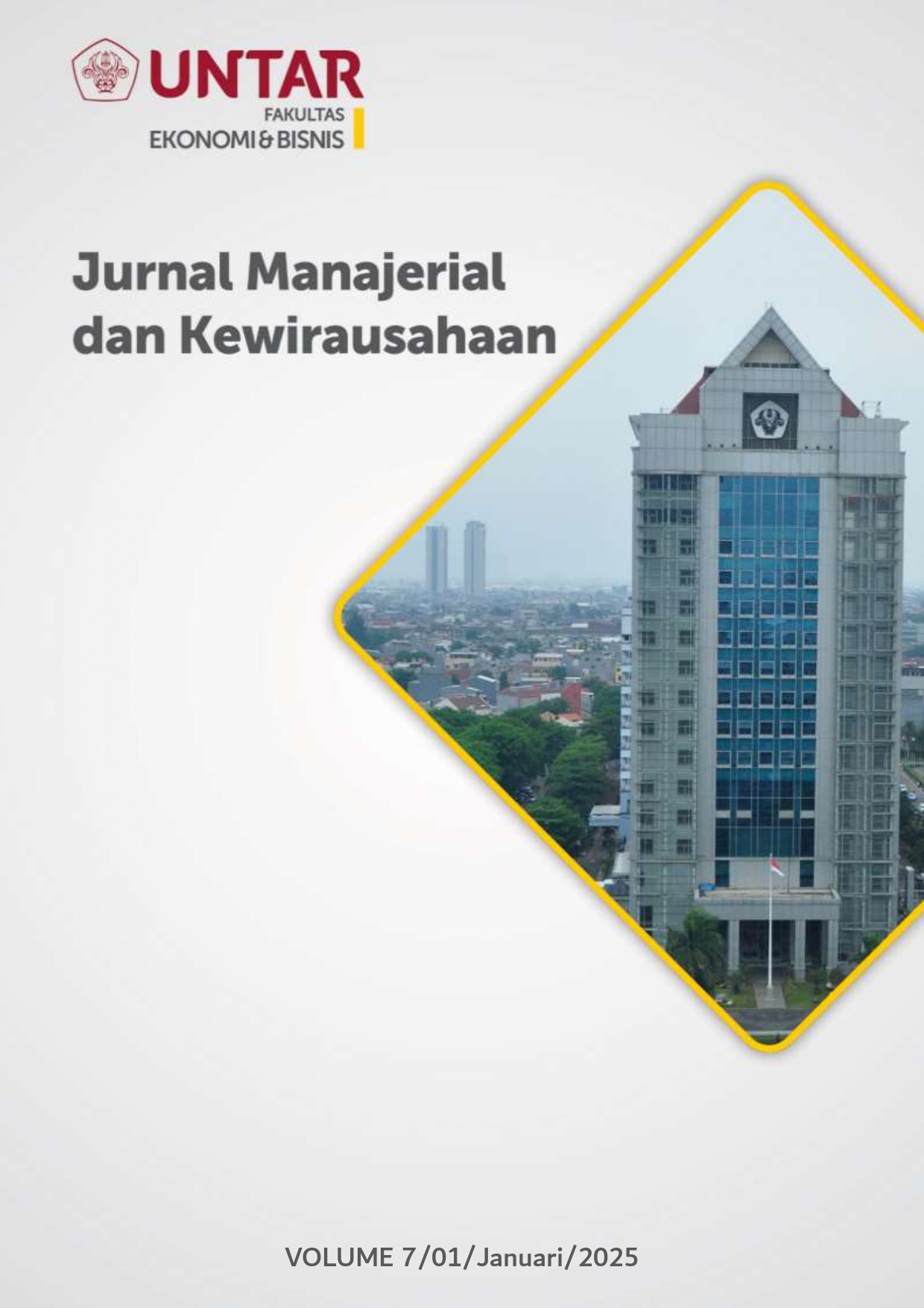Pengaruh Dimensi Keuangan dan Tingkat Pendapatan terhadap Keputusan Investasi Generasi Z di Jakarta Barat
Main Article Content
Abstract
This study aims to analyze the impact of financial knowledge, financial attitude, and income on the investment decisions of Generation Z in West Jakarta. The research uses a quantitative method with data collection in the form of a questionnaire distributed to Generation Z respondents. The sample for this study consists of Generation Z individuals aged 17-27 years in West Jakarta who invest in the capital market. The researcher applies a Non-Probability Sampling technique with a Purposive Sampling method, meaning that sample selection is based on specific criteria that have been predefined. The data analysis method used to test the variables and hypotheses is through the use of Partial Least Squares (PLS) 4 software. The study reveals that financial knowledge and financial attitude have a positive and significant impact on investment decisions, while income shows only a positive but not statistically significant effect.
Article Details
Section

This work is licensed under a Creative Commons Attribution-NonCommercial-ShareAlike 4.0 International License.
This work is licensed under a Jurnal Muara Ilmu Ekonomi dan Bisnis Creative Commons Attribution-ShareAlike 4.0 International License.,/p>
References
Afriani, D. & Halmawati. (2019). Pengaruh Cognitive Dissonance Bias, Overconfidence Bias dan Herding Bias terhadap Pengambilan Keputusan Investasi. Jurnal Eksplorasi Akuntansi, 1(4), 1650–1665. https://doi.org/10.24036/jea.v1i4.168
Ajzen, I. (1991). The Theory of Planned Behavior. Organizational Behavior and Human Decision, 50(2), 179-211. https://doi.org/10.1016/0749-5978(91)90020-T
Ajzen, I. (2020). The Theory of Planned Behavior: Frequently Asked Questions. Human Behavior And Emerging Technologies, 2(4), 314–324. https://doi.org/10.1002/hbe2.195
Arifin, A. Z. (2018). Influence Factors toward Financial Satisfaction with Financial Behavior as Intervening Variable on Jakarta Area Workforce. European Research Studies Journal, 21(1), 90-103. https://doi.org/10.35808/ersj/932
Armalia, N. D. (2018). Pengaruh Literasi Keuangan,Tingkat Pendidikan,Dan Tingkat Pendapatan Terhadap Pemilihan Jenis Investasi Pada Masyarakat Sidoarjo. Jurnal stie perbanas surabaya.
Azizah, N., Kusuma, H., & Arifin, Z. (2022). Economics Development Analysis Journal Does Fiscal Decentralization Increase The Economic Growth In Sulawesi Island? Article Information. Economics Development Analysis Journal, 1.
Bagus, I., & Purbawangsa, A. (2018). Pengaruh Literasi Keuangan, Pendapatan Serta Masa Bekerja Terhadap Perilaku Keputusan Investasi Iga Mertha Dewi 1 (Vol. 7).
Bordalo, P., Rafael, N. G., Porta, L., O’brien, M., Shleifer, A., Gennaioli, N., & Porta, R. La. (2023). Nber Working Paper Series Long Term Expectations And Aggregate Fluctuations Long Term Expectations And Aggregate Fluctuations.
Ghozali, I. (2016). Aplikasi Analisis Multivariete Dengan Program IBM SPSS. Badan penerbit universitas diponegoro.
Humaira, I. (2018). The Influence Of Financial Knowledge, Financial Attitude, And Personality Towards Financial Management Behavior On Small Medium Enterprises At Batik Craft Of Bantul Regency.
Julita, J., & Prabowo, B. R. (2021). Keputusan Investasi Saat Pandemi (Studi Kasus Nasabah PT.Pegadaian (Persero) CP Helvetia. https://doi.org/ 10.30596/snk.v2i1.822o
Lusardi, A., & Mitchell, O. S. (2023). The Importance Of Financial Literacy: Opening A New Field.
Mahadevi, S. A., & Asandimitra, N. (2021). Pengaruh Status Quo, Herding, Behaviour, Representativeness Bias,Mental Accounting Serta Regret Aversion Bias Terhadap Keputusan Investasi Investor Milenial Di Kota Surabaya. Jurnal Ilmu Manajemen, 9(2).
Muharramah, U., Astriana, Y., Riana, D., & Setiawan, H. (2023). Investment Interest Of Young Generation In The Sriwijaya State Polytechnic. Theory of Planned Behavior Approach Asean International Journal Of business, 2.
Natsir, K. & Arifin, A. Z. (2021). The Effect of Product Knowledge and Influence of Society on Investment Intention of Stock Investors with Perceived Risk as Mediation. Studies of Applied Economics, 39(12), 1-16. https://doi.org/10.25115/eea.v39i12.6022
Raihana, S., & Dewi, A. S. (2022). Ef fect Of Financial Literacy On Investment Interest (Case Study In Early Adult Age In Bandung City). Budapest International Research And Critics Institute-Journal, 5, 22819–22825. https://doi.org/10.33258/birci.v5i3.6292
Safryani, U., Aziz, A., & Triwahyuningtyas, N. (2020). Analisis Literasi Keuangan,Perilaku Keuangan,Dan Pendapatan Terhadap Keputusan Investasi. Jurnal Ilmiah Akutansi Kesatuan, Vol.8 No.3,2020, 319–332.
Siska, K., Sunu, D., & Zainul, K. (2021). Investment Decisions: The Results Of Knowledge, Income, And Self-Control. The Asian Institute of Research Journal Of Economics And Business, 4(1), 100–112. https://doi.org/10.31014/aior.1992.04.01.324
Sugiyono. (2015). Metode Penelitian Kuantitatif, Kualitatif Dan R&D.Bandung: Alfabeta.
Sugiyanto, T. (2019). Financial Literacy, Financial Attitude, And Financial Behavior Of Young Pioneering Business Entrepreneurs.
Umiyati, H., Noor Kusumawati, Y., Suherman, A., Anwar, K., & Kumbara Wedha, I. (2023). Analysis Of the Effect Of Motivation And Knowledge About Capital Market, Return, Risk And Minimum Capital On Interest To Invest In The Indonesia Stock Exchange (Case Study In The Financial Audit Board Of The Republic Of Indonesia). International Journal Of Business, Economics And Social Development, 4(3), 112–122.
Valentya Rimadhani. (2018). Pengaruh Tingkat Pendapatan,Literasi Keuangan Dan Pengalaman Keuangan Terhadap Pengambilan Keputusan Investasi Keluarga Di Surabaya. Management stie perbanas surabaya, 1–14.

